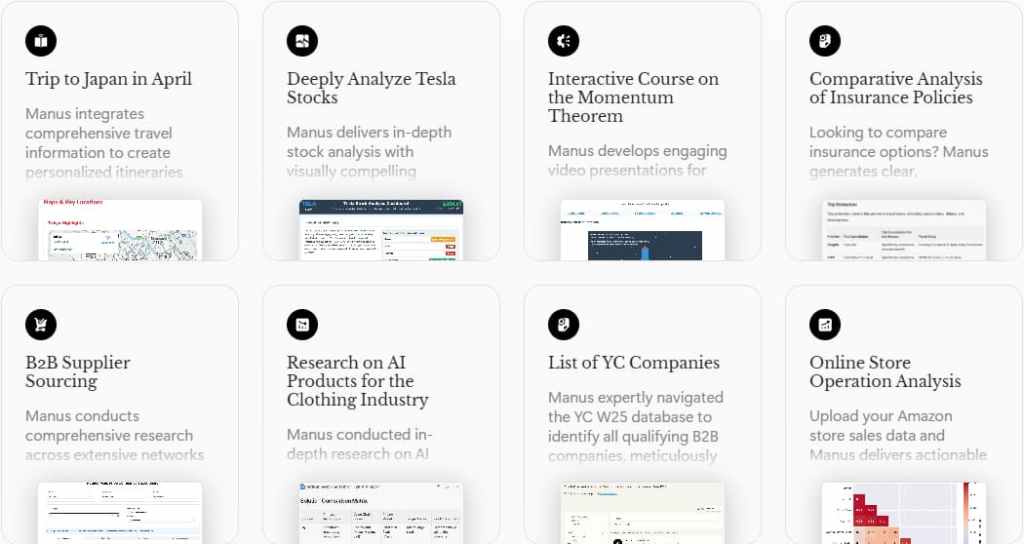Manus AI: The Future of Autonomous AI Agents Is Here
Have you ever wished for a digital assistant that didn’t just answer your questions but actually completed tasks for you? That’s exactly what Manus AI brings to the table. This new Chinese AI agent is making waves across the tech world—and for good reason.
What Is Manus AI?
Manus AI isn’t your typical chatbot. Created by Chinese startup Butterfly Effect, it’s what experts call a “general AI agent”—it can think and act independently to complete complex tasks from start to finish.

Unlike regular AI chatbots that simply respond to your questions, Manus can:
- Build websites from scratch
- Create detailed travel plans
- Analyze stocks and financial data
- Search for real estate based on your exact needs
- Screen resumes and rank job candidates
“It’s more like a human being,” explains Red Xiao Hong, the 33-year-old founder and CEO of Butterfly Effect. While chatbots just think and answer questions, Manus interacts with its environment, gathers feedback, and uses that information to improve its performance.
How Does Manus AI Work?
Manus works through a multi-agent system that breaks down complex tasks into smaller, manageable steps:
- Task Input: You assign a task through a simple chat interface
- Task Breakdown: Manus divides your request into smaller subtasks
- Specialized Agents: Different AI agents tackle specific parts of the job
- Execution: Each agent works on its assigned task, using tools and websites as needed
- Integration: All the results come together in a final product
- Error Handling: If something goes wrong, Manus finds alternatives to keep the process moving
What makes this system unique is “Manus’s Computer”—a window that shows you exactly what the AI is doing in real-time. You can even jump in and help if it gets stuck.
Who Created Manus AI?
Manus AI was developed by Butterfly Effect, a Tencent-backed startup based in Wuhan, China. The company is led by Red Xiao Hong and chief scientist Peak Ji Yichao.
Interestingly, Butterfly Effect didn’t create its own large language model from scratch. Instead, they built Manus using existing models, including Anthropic’s Claude and fine-tuned versions of Alibaba’s Qwen.
This approach shows a different strategy compared to other Chinese AI companies—focusing on practical applications rather than competing directly with ChatGPT and other language models.
How Good Is Manus AI?
Early testers report that using Manus feels like working with “a highly intelligent and efficient intern.” It’s not perfect—sometimes it misunderstands tasks, makes wrong assumptions, or takes shortcuts—but it explains its thinking clearly and learns quickly from feedback.
In benchmark tests designed to evaluate general AI assistants, Manus has already achieved impressive results, even outperforming some top systems like OpenAI’s Deep Research in certain tasks.
However, Manus still faces some technical challenges:
- Occasional system crashes and server overload
- Difficulty accessing paywalled content
- Sometimes getting stuck in repetitive cycles
- Struggling with very complex decision-making
Despite these issues, Manus costs significantly less than some competitors—reportedly about $2 per task, which is one-tenth the cost of OpenAI’s DeepResearch.
How Can I Get a Manus AI Invitation Code?
Currently, Manus AI is available by invitation only, with less than 1% of people on the waitlist receiving access so far. The company hasn’t shared how many people are waiting, but their Discord channel already has over 186,000 members—showing just how much interest there is.
If you’re hoping to get your hands on a Manus AI invitation code, your best bet is to:
- Join their official Discord channel
- Follow Manus AI’s social media accounts for announcements
- Check tech forums where early users might share extra invitation codes
What Does This Mean for the Future of AI?
Manus AI represents a significant shift in how we interact with artificial intelligence. Instead of just asking questions and getting answers, we’re moving toward AI that can handle entire workflows independently.
This development is especially notable coming from China, showing that Chinese AI companies aren’t just following Western counterparts but actively shaping the future of AI in their own way.
The name “Manus” comes from the famous MIT motto “Mens et Manus” (mind and hand), reflecting the belief that knowledge must be applied to make a real impact. This perfectly captures what makes Manus different from other AI tools—it extends beyond thinking to actually doing.
As Butterfly Effect continues to improve Manus and plans to open-source some of its models later this year, we may be getting our first glimpse of what truly helpful, autonomous AI will look like in our daily lives.
Would you trust an AI agent to handle your tasks independently? The answer might depend on how well tools like Manus can bridge the gap between amazing demos and reliable real-world performance. One thing’s clear—the future of AI isn’t just about smarter chatbots; it’s about AI that can truly get things done.
Read our most recent articles:
- Is Character AI safe for kids in 2025?
- Anthropic Revolutionizes AI Development with New Prompt Evaluation Tools
- Anthropic Unveils Fine-Tuning for Claude 3 Haiku on Amazon Bedrock
- Kling AI Video Generator: How to access and use?
- Top 5 best characters to talk to on Character.Ai
- How to Create Dance Videos with ViggleAI: A Step-by-Step Guide
- Character AI Call Feature brings a new era of interactive conversations
Get the latest news and updates from the world of Artificial Intelligence with our weekly newsletter, Artificial Tracker.







